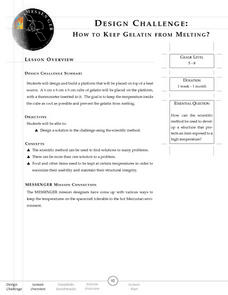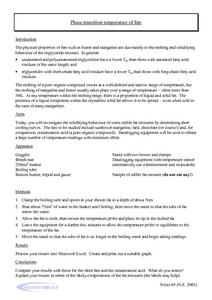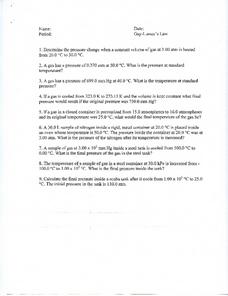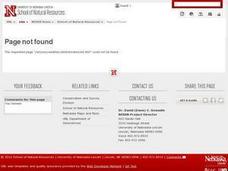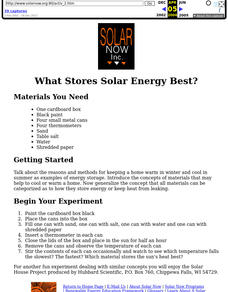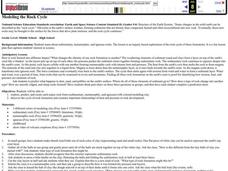Curated OER
How To Keep Gelatin From Melting
Young scholars investigate the concept of heating and prevention of temperature increase while they design a platform made to hold gelatin that is exposed to heat from melting. Students make observations and rate the effectiveness of...
Curated OER
Miniature Water Cycles
Students construct a model of the water cycle in action using two-liter pop bottles to build a terrarium. Locate examples of evaporation and condensation in the water cycle (e.g., water evaporates when heated and clouds or dew forms when...
Curated OER
Phase Transition Temperature of Fats
In this chemistry worksheet, students investigate through experimentation the solidifying behavior of some edible fat mixtures by determining their cooling curves. Then they data-log equipment to obtain a large number of temperature...
Curated OER
Hypothesize This!
Students role play scientists to prove a hypotheses. They determine whether or not walruses stay warmer in water or in air. Students also determine in which environment they lose more body heat.
Curated OER
Some Like It Hot, Some Like It Cold
Learners are explained that thermophiles are organisms that have optimal growth temperatures above 50oC. They investigate the temperature ranges for the growth of common bacteria. Students answer the question of do either of these...
Curated OER
Air Has Pressure
Seventh graders analyze evidence about particles and the exertion of air pressure. They observe an experiment with a hard boiled egg. fire and a bottle to discover the heating, cooling, and speed of air particles. They write explanations...
Curated OER
Gay-Lussac's Law
In this Gay-Lussac's Law worksheet, students determine the pressure change when a constant volume of gas is heated. Then they identify what the pressure is at standard temperature. Students also determine and calculate the final pressure...
Curated OER
Cracked Marbles
Fourth graders determine how weathering, specifically ice, snow, and freezing water change the Earth's surface and rocks. After completing the investigations, they explain how heating and cooling expand and contract marbles until cracks...
Curated OER
What's it Like Inside the Sun?
Learners perform experiment in which they model convection as it occurs in our Sun. They also explain that convection acts where the effect of gravity and heat are present (low density fluids can rise and cool, and high density fluids...
Curated OER
Melting and Freezing of Water
Students differentiate the three states of matter. In this chemistry lesson, students analyze graphs of heating and cooling curve of water. They complete a lab report and discuss results.
Curated OER
Gases, Liquids And Solids
Students investigate how gases are different from solids and liquids and that they can evaporate and condense. They observe water boiling in a teapot and discuss what happens when the steam touches a cold window, complete an online Heat...
Curated OER
Causal Patterns in Air Pressure Phenomena
Students consider the relationship between pressure and temperature. They observe a demonstration and explore the relationship between heat and volume when pressure remains constant. Students discuss relational causality and consider...
Curated OER
Air Expansion and Contraction
Students observe that air exerts pressure, that heated air expands and that cooled air contracts. After the demonstration, students engage in a question and answer session about what they saw.
Curated OER
Am I Hot or Am I Cold?
Young scholars practice using a thermometer to determine how the air around the earth gets heated and cooled by the sun. Students chart the daily inside and outside temperature for two weeks.
Curated OER
Coal Moisture Analysis
Students investigate coal samples and analyze its drying loss under controlled conditions. They establish the loss in mass of a sample when heated under controlled conditions of temperature.
Curated OER
What Stores Solar Energy Best?
Students discuss reasons and methods for keeping a home warm in winter and cool in summer as examples of energy storage. Students participate in a solar energy experiment.
Curated OER
Warm and Cold Air
Students examine what happens to air when it is heated or cooled. They conduct an experiment using bottles and balloons, record and discuss their observations, and write a hypothesis.
Curated OER
Keeping Warm
Fifth graders measure the temperature of water using a thermometer. They record the temperatures of water on a chart. Students use the temperature data to determine which materials are the best conductors of heat. They discuss their...
Curated OER
Cookie Bar Coal
Students observe the effect of heat and pressure on materials representing those involved in the formation of coal.
Curated OER
Don't Marry the Mole!
Third graders examine the power of solar energy. In groups, they create their own pizza box solar oven to discover the power of the sun and how it is a source for heat and light. To end the lesson, they use the internet to examine...
Curated OER
Modeling the Rock Cycle
Students explore the differences in sedimentary, metamorphic, and igneous rocks. They discuss the rock cycle of the different formations. Students discuss how rock is formed into different shapes. They explore, predict, and create each...
Curated OER
Peanut Brittle Volcano
Students see simulated lava flow down a simulated volcano. They examine how lava cools fastest on the surface.
Curated OER
The Same but Different Part II
Third graders experiment with beakers of water and balloons to measure the volume of the gas in the balloon. They determine ways to change the volume of air in the balloon which changes its size but not its physical state. By heating the...
Curated OER
The Learning Bottleneck
Students identify and analyze what energy is and how they feel after moving around a lot. They identify other ways that they can acquire heat and if there is some sort of mechanism for storing energy. Finally, students construct their...
Other popular searches
- Heating and Cooling
- Heating and Cooling Curves
- Science Heating and Cooling
- Heating and Cooling Curve
- Heating Cooling Curves
- Heating Cooling Curve
- Heating and Cooling Energy
- Heating and Cooling Systems
- Milk Heating and Cooling
- Heating and Cooling Water
- Heating Adan Cooling Curves
- +Heating and Cooling


